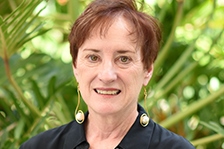
People & Business
USF Sarasota-Manatee Professor Evaluates Resettlement Practices at Refugee Center
Countries that receive refugees should consider emulating the work done at the Mangere Refugee Resettlement Center in New Zealand, says University of South Florida Sarasota-Manatee education professor Jody McBrien, PhD.
McBrien recently received a Fulbright Specialist Award to evaluate the Refugee Education Center at the Mangere Refugee Reception Center, operated by the Auckland University of Technology (AUT). She completed the six-week assignment on Sept. 12.
Her project examined how written policies are translated into daily practice at the center. Those policies emphasize values of welcome, safety, respect, support and hope while teaching the basics of English and Kiwi culture.
“New Zealand is unique in its approach to refugees,” McBrien said. “New Zealand provides housing, medical and education services all in one location for an initial six weeks. This helps the refugees feel safer and more at home so that, ultimately, they are prepared to successfully integrate into their new society.”
Thirty-seven nations are signatories to a U.N. agreement to accept refugees, but each country devises its own processes to educate refugees and provide health care, housing and other services as the refugees begin new lives in their host countries.
Typically, resettled refugees are met at the airport by volunteers and brought to an apartment. From there, they must navigate a maze of agencies for language learning, medical care and other social services. New Zealand streamlined this process by providing initial resettlement at Mangere, followed by robust lessons in English and culture provided by the New Zealand Red Cross in resettlement communities.
McBrien said she was impressed by the center’s organization and how welcome the refugees were made to feel.
“It felt very safe for the refugees, which ultimately aided in their learning and integration,” she said. “I observed the transition from the first to the last couple of weeks, and I could see how they came to feel welcome and comfortable. They were so grateful to New Zealand. Refugee students made this clear in their comments in class and in speeches they gave at formal ceremonies at the center.”
Under the integration program, the refugees spend six weeks at the center before transitioning to one of six New Zealand cities to begin new lives. During that time, they receive an intensive education, not only learning English, but also absorbing the nation’s customs, history, currency and geography. They learn about government programs, how to shop at a grocery store, obtain a driver’s license, use public transportation, enroll children in school, find and apply for jobs, attain health care services and more.
The center provides education programs from early childhood and for primary and secondary learners as well as adults. Currently, the top three refugee populations are from Colombia, Afghanistan and Myanmar.
To prepare her report, McBrien observed classes and interviewed teachers, interpreters and staff members. She examined the center’s policies, values and objectives, and then compared those to the services provided. At the conclusion, she wrote a 56-page paper for AUT.
Her study comes as the Mangere center is poised to expand. Now equipped to handle 1,000 refugees annually, the center’s capacity is set to increase to 1,500 refugees next year.
“Overall, I’d say this example could serve as an international model,” McBrien said. “It should be replicated. It’s phenomenal. Their goals are to help the refugees feel welcome and safe and to integrate them and make them feel capable to enter New Zealand society, and they’re doing that very successfully.”
For more information about USF Sarasota-Manatee, visit http://usfsm.edu/.



You must be logged in to post a comment Login